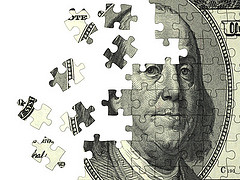
Dollar (Photo credit: s_falkow)
Irresponsible and unmindful spending leads to debt. Nowadays, people prefer to use their credit cards in purchasing instead of cash. Because of this, they tend to overspend and abuse the purchasing power their credit cards hold. Only when this unconscious habit has been translated into accumulated credit card notification letters do they realize their overindulgences.
[Kevin] It does feel less painful and easier to swipe a credit card instead of taking a few $20s out of the wallet. At the same time, that pain will be felt once the bill arrives in the hundreds of dollars!
Fortunately there are ways to avoid a great deal of debt. By employing smart purchasing practices, you will be able to prevent yourself from experiencing impending financial anxieties, as well as cram for debt relief programs that would help you save your finances. As a consumer, it is anticipated that you know your spending limits whether you use cash or credit card. To help you practice smart spending, here are simple suggestions to help you avoid debt and improve your finances.
1. Remind yourself of your income. Times are tough and money is not easy to attain. Reminding yourself of the hard work you went through to earn your money will more likely help you spend it wisely. At the same time, considering your income helps you set a limit on your spending allowance and prevent you from purchasing items that cost more than what you make.
[Kevin] Keep a healthy gap between expenses and income, and you’ll be off to a great start.
2. Take note of the prices. When you shop, it is good to take time to set your options and evaluate items carefully to know which ones are worth every penny. Markets sell items that have similar components, which are priced differently depending on the brand. To save more, a shopper must learn to check and compare price tags of items in mind.
3. Pay with cash more often. It is true that credit cards are useful and efficient when purchasing but using on hand cash helps you recognize and monitor your expenses more. People who prefer to pay with cash rather than credit card are less likely to have credit card debt and avail of debt relief programsin the future.
4. Explore thrift shops. Thrift shops offer a great variety of clothing and home items that may suit your liking for a lesser cost. To add to this, most thrift shops charge you with cash helping you to lessen your credit card debt.
5. Put your necessities first. Practical consumers spend on what they need first before giving into their whims if ever there is still money left from spending on the needs. This smart spending practice ensures that you have all your essential needs before anything else. People acquire debt when they spend more on wants than on needs. As soon as they find out that they do not have what they need, they resort to using credit which accumulates in a while.
Starting with practical steps in spending not only saves you from financial debt but also helps you monitor your expenses and save more. Simple changes do not solve debt problems overnight but small steps accumulate in the long run when done routinely. Keep in mind that great things start from small beginnings, and that includes making gradual changes in your spending practices to ensure a good and healthy financial life in the years to come.

No comments:
Post a Comment